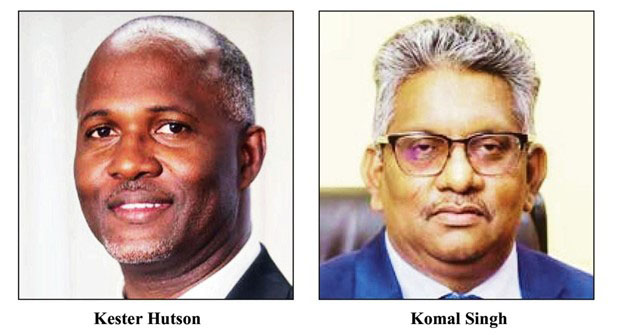The Private Sector Commission (PSC) and the Georgetown Chamber of Commerce and Industry say they are still actively addressing the concerns raised by local businesses regarding unfair competition from Chinese-owned businesses and plan to soon meet with local regulatory agencies and Beijing’s Ambassador.
“From the Chamber’s standpoint, it is to engage with the Chinese Embassy, the Ambassador and her team and indicate some of our concerns and more so advocating for more compliance among Chinese businesses.,” GCCI President Kester Huston told Stabroek News when contacted last week.
“Equally, what is important is the monitoring and enforcing by our regulatory bodies such as the Standards Bureau and GRA… as items (are) being imported and, of course, from an operational standpoint, that they are to see that they are compliant. We want a level playing field. We are engaging them. We have started the process of reaching out and will continue to do so…” he added.
He said that the Chamber believes the issue is an important one and is currently working on ensuring, that especially the regulatory side of local businesses here is up to the necessary operational and other requirements.
For the PSC’s part, its President Komal Singh said that next week the body has a meeting which will be discussing the issue. He said that the PSC has set up a team and is trying to gather more information so when they meet they will have informed discussions based on facts.
However, Singh said that the PSC maintains that all businesses are to operate within the ambit of the law.
“We are trying to gather more information but next week we are going to have an internal Council meeting and this matter will be addressed,” he said.
Resolute
“The Private Sector Commission remains resolute to ethical business practices and following the rule of law. As such we call on all business owners to follow the rule of law. Let us work together to create a level playing field which will allow every business to be successful,” Singh also posited.
Last month, this newspaper reported that a group of over 60 business owners across the country wrote to President Irfaan Ali in April seeking a meeting, as they bemoaned what they said was the unfair competition they face from the many non-naturalized Chinese-owned businesses that they believe are operating without requisite licences, permits and certificates.
The letter was issued under the rubric, “Guyanese Businesses Owners Association”.
“We are a consortium of Guyanese business owners and concerned citizens, comprising of about sixty-five (65) entities and individuals. We wish to express our serious apprehensions regarding the proliferation of non-naturalized Chinese owned businesses, predominantly supermarkets and hardware stores, throughout communities in Guyana,” stated a letter dated April 22, and signed by 49 business owners.
“These establishments often emerge in close proximity to our own businesses, and sometimes multiple similar Chinese stores are established on the same street. While we recognize and embrace healthy competition for the benefit of consumers, our primary concern pertains to the perceived lack of adherence by Chinese businesses to the same laws and regulations governing Guyanese enterprises,” the letter seen by Stabroek News, added.
The list included Parshuram and Govardhan Arjune, of the Survival Supermarket and Survival Shopping Complex, Rajin Ganga of Bakewell, Dexter John of Home Everything, Parmanand Persaud of Crown Mining Supplies; and Andrew’s Supermarket.
Guyana Revenue Authority (GRA) Commissioner General Godfrey Statia had confirmed that the letter was forwarded to him and that the GRA was investigating.
Some of the business persons who subscribed to the letter are a part of the Private Sector Commission, the Georgetown Chamber of Commerce and Industry (GCCI), and the Guyana Manufacturing and Services Association (GMSA).
However, this newspaper understands that the letter was not sent to or through those bodies. It is unclear why the decision was taken to go first to the President.
Hutson had told this newspaper that they became aware of the situation following the Stabroek News article and have put the issue on their agenda. He explained that about three years ago the issue had come up and following the recent concerns “we think it is time to relook at it and have a decision.”
Concerned about the rapid proliferation of Chinese businesses, the letter posited that this, “Suggests significant capital investments” and the signatories questioned if those entities are complying with Guyana’s anti-money laundering laws overseen by the Bank of Guyana regarding the influx of substantial funds.
It also asserted that many of the Chinese stores “fail to provide tax invoices automatically with purchases, and when requested, such invoices are begrudgingly provided.”
“Additionally, they neglect to display TIN on invoices, omit charging VAT on applicable items and abstain from listing product descriptions on invoices. Furthermore, there have been instances where consumers unknowingly purchased expired food items from these establishments, only to find no recourse for product support.”
The local business persons expressed the belief that these are flagrant breaches which have raised questions about accountability and concerns about oversight by the relevant authorities.
“While we refrain from premature conclusions, we cannot help [but] speculate whether these non-naturalized Chinese business receive preferential treatment or special concessions. Thus, we seek clarification on this matter,” the letter said.
“The rapid expansion of these Chinese stores, fuelled by their ability to invest and develop at an accelerated pace compared to local businesses, coupled with their non-compliance with established norms and their capacity to offer products at significantly lower prices, poses an existential threat to the Guyanese business community,” the missive added.
The consortium had requested a meeting with the President and if he was unavailable, they hoped someone from his office could stand in for him, so that the issue could be addressed promptly.





